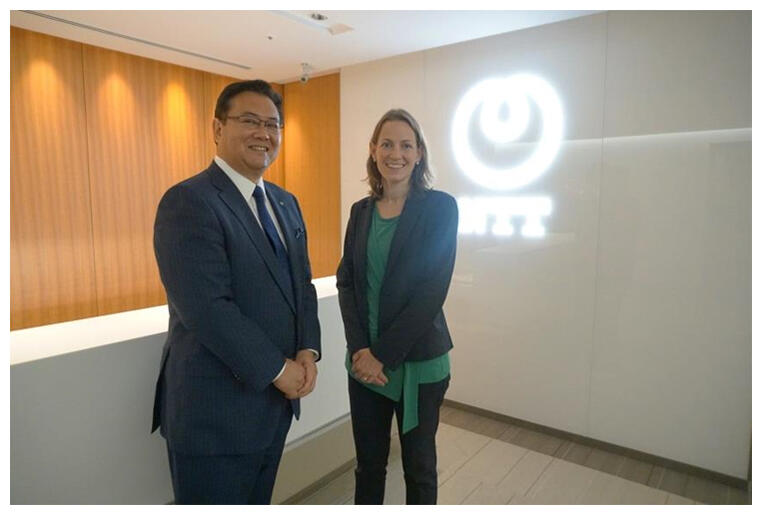Microsoft ends support for Internet Explorer on June 16, 2022.
We recommend using one of the browsers listed below.
- Microsoft Edge(Latest version)
- Mozilla Firefox(Latest version)
- Google Chrome(Latest version)
- Apple Safari(Latest version)
Please contact your browser provider for download and installation instructions.
October 29, 2018
NTT Becomes a Member of "EP100" and "EV100" the Global Initiatives
On October 29, 2018, Nippon Telegraph and Telephone Corporation (Head office: Chiyoda-ku, Tokyo; President & CEO: Jun Sawada; "NTT") became a member of The Climate Group's "EP100" (*1) and "EV100" (*2) initiatives, and has committed to transition its entire fleet to electric vehicles and make smarter use of energy. NTT is the first telecommunications operator in the world to become a member, and the first company in the world to join both "EP100" and "EV100" at the same time.
*1"EP100": A global initiative by The Climate Group in partnership with Alliance to Save Energy, which brings together companies that aim to double their energy productivity (raise their energy saving rate by 50%, etc.)
*2"EV100": A global initiative by The Climate Group bringing together companies committed to accelerate the shift to electric transport.
Background of Membership and Future Initiatives
With its development in its main business field of ICT, the NTT Group has used an increasing amount of electricity, particularly for large-volume data processing, and air conditioning for large-scale servers. In fiscal 2017, the Group used 8.31 billion kWH of electricity, accounting for about 1% of the total amount used in Japan. With the rapid increase telecommunications traffic in recent years, the more efficient use of energy is becoming an even more important issue. To contribute to the resolution of this issue, NTT has been promoting the introduction of high-efficiency DC power equipment and energy-saving in communications equipment, with the aim of doubling the energy productivity of the telecommunications business (*3) in 2025 compared with 2017.
Furthermore, in order to reduce NTT's environment impact and our vehicle ownership costs, we are promoting conversion to EV of the 11,000 general-purpose vehicles owned by the NTT Group, with the aim of converting 50% of general-purpose vehicles to EV by 2025 and realizing 100% EV conversion by 2030.
Through these initiatives, announced as part of NTT's ESG management at the press conference given by Jun Sawada upon his appointment as President & CEO on June 26, 2018, we are striving to promote the development and growth of the NTT Group and to contribute to Japanese society and global society.
- *3Energy efficiency of the telecommunications business: Power efficiency per volume of telecommunications operations including data centers at the five main Group companies (NTT East, NTT West, NTT Communications, NTT DOCOMO, NTT Data).
Mike Peirce, Corporate Partnerships Director, The Climate Group, commented: "As the first company to join both "EV100" and "EP100", NTT is placing decarbonized, energy efficient systems at the core of its business strategy - demonstrating climate leadership while future-proofing its operations. By addressing rising energy use from increased data traffic and rolling out low-carbon transport, NTT is lowering emissions, saving on energy bills, and growing the clean economy all at the same time."

(photograph of Sandra Roling, Head of EV100, The Climate Group, visited our Senior Executive Vice President Motoyuki Ii on October 10, 2018)

Inquiries
Public Relations Office
NTT
Tel: 03-5205-5550
Information is current as of the date of issue of the individual press release.
Please be advised that information may be outdated after that point.
NTT STORY
WEB media that thinks about the future with NTT










